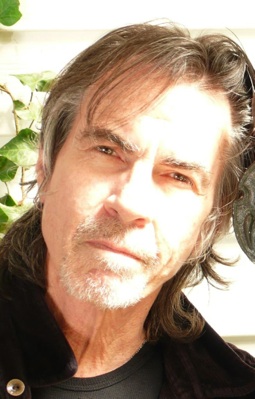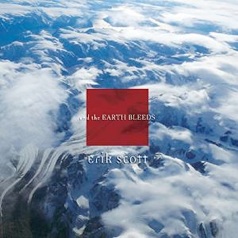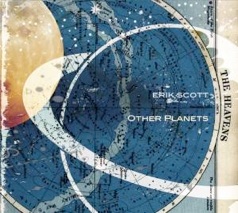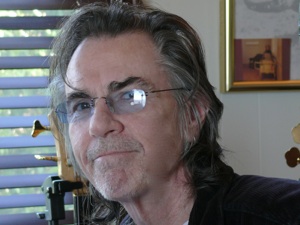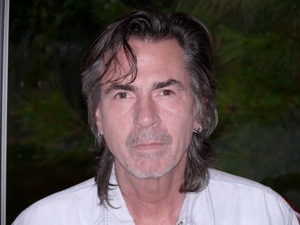I recently reviewed a very impressive album called
Spirits by Erik Scott, an artist I knew nothing about. As I started looking around the internet for more information about him, I discovered that Erik is an artist that I’ve probably been hearing for decades without realizing it. A professional composer and musician for more than 40 years, Erik Scott has worked as a session bassist, has toured and played with Alice Cooper and The Turtles (Flo and Eddie) - among many others, and has written quite a lot of music for popular television shows. Between that and the lively correspondence we had regarding my review, I decided that Erik Scott was someone I wanted to get to know better and help get the word out about his music. Enjoy this candid interview!
KP: Hey Erik! Happy New Year! How are things down in the Bay Area?
ES: It's a great area to live in, and the weather doesn't require the type of commitment that Chicago winters demand.
KP: True! I really loved reviewing your latest release,
Spirits, which was originally released in 2009. Was it actually your first solo release?
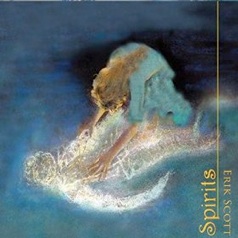
Click the album cover above to read Kathy's review.
ES: Well, actually…no. Spirits is a new release. But, there are five tunes that were on the first album from 2009, Other Planets, because they never got released to the New Age genre. These have been re-mastered and in some cases re-mixed or re-arranged.
KP: Oops! So Spirits is actually the third album under your own name?
ES: Yes, it is. At the time of the Other Planets release, being new to the 'indie' world after 40 years in the old world of record labels with their Publicity and Promotion departments, I was simply not prepared. I never properly promoted the record or entered it into the Contemporary Instrumental or New Age World, with one notable exception: a former record company friend suggested I send it to John Diliberto at Echoes, who actually made Other Planets a CD of the Month. And then I went back to writing and forgot there was no record company doing what I thought they were doing…ha..I was quite ignorant of the 'indie' world, and all the hats that you must wear after you have made the music. In fact, it was John Diliberto and the Echoes exposure that first introduced me to the ever-morphing world of 'New Age' - the genre and whole world of listeners who welcome styles of musical expression that don't have to adhere to the Top Forty parameters of 'Pop' or even 'Rock' music. Until that release in 2009, I really was unaware of that world.
KP: There have been so many huge changes in the music industry over the past several years! It really pays to be a good business-person as well as a talented composer/musician!
It looks like Spirits is getting quite a few enthusiastic reviews in addition to mine. Are you going to be touring to promote it?
ES: I very much hope to, and am preparing myself. I must decide what instrumentalists to work live with, because as you know, on the record I love to have different instruments and colors from song to song. Sometimes a violin is important to the tune, and the next tune features a steel guitar along with the melodic bass and other instruments I use on recordings.
KP: You might need a very big tour bus!
I know you have released three solo projects, but do you have a tally for how many albums you have played on?
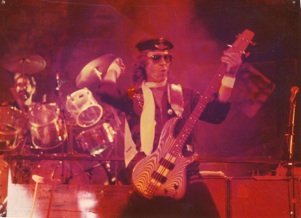
Erik with Alice Cooper Special Forces Tour 1981.
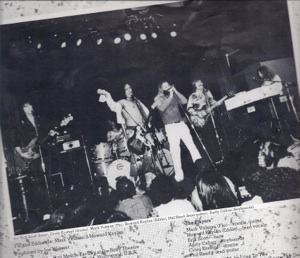
Erik (far left) with Flo and Eddie 1975.
ES: I think since 1969, and counting the times I worked as a session bassist in LA, there are around 55-60 records you could buy in the stores, back when there were record stores. That number includes production and writing, along with playing my main instrument, the electric bass, with a variety of artists. A fairly complete discography is available at
my website and at
Wikipedia.
KP: You have been a professional musician since the late 1960’s. Who are some of the artists and bands you have played and toured with?
ES: I spent multiple years recording and touring with Sonia Dada (15 years and 6 albums), Alice Cooper (the early 80's), Flo & Eddie (the mid-70's), and Kim Carnes (mid-80's), along with some artists I loved but that didn't make it into the mainstream. People like Franne Golde, Peter McIan, and Signal.
As more of a session musician, I co-wrote and played on “Father Father,” the title song from the Grammy winning album by Pop Staples, a WC Handy Foundation-winning song by Mavis Staples, co-wrote tunes recorded by Triumph, Ted Nugent (in the 80's), and worked on the records of many others. Again, for those interested in a more comprehensive history, I would refer them to Wikipedia or my website, both links listed above. I won't make such a list here, with the wildly eclectic, and some might say, checkered, past. :0)
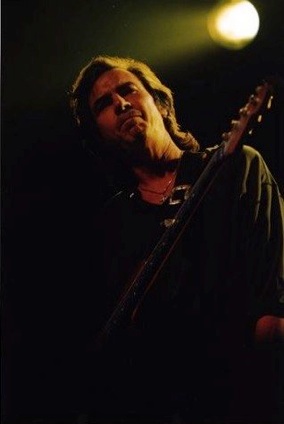
Erik 2004
KP: Let’s back up a bit and find out more about your background. Where were you born and where did you grow up?
ES: Born in Milwaukee, I was an Air Force brat and traveled around until my father, who flew fighter jets, crashed and was killed. Then I grew up in the Midwest, between Chicago and Milwaukee, in the small town of Gurnee, Illinois.
KP: That’s terrible about your dad! Are any other members of your family musicians?
ES: No. My mother enjoyed records around the house, but wasn't thrilled when I started pursuing it professionally.
KP: That sounds pretty normal! How old were you when you started playing music? Did you start out with bass?
ES: I started out as a nine year old in the fourth grade, on trombone.
KP: Did you take lessons or are you self-taught?
ES: Grade school and High School trombone at school. Self-taught on the bass - I listened and learned.
KP: Do you play other instruments besides bass?
ES: In the recording studio, I can play enough keyboards to get my ideas across, and am pretty good at programming drums and percussion, but I don't stand up and play those instruments in public.
KP: How old were you when you wrote your first song?
ES: Hmmm…I believe in the early seventies, when I was in my early twenties. And I must differentiate between composing music and melody, and writing lyrics. They are quite different as you know, especially for someone who spent many years attempting to master an instrument.
KP: Absolutely! When did you move to the Bay Area?
ES: In the autumn of 2010.
KP: Do you perform your own music in concerts very often?
ES: Ha, Kathy, I think you have asked me a trick question - probably without meaning to. Well...There are two answers to that question. First, I'm always playing my own music. Since 1969, any time I'm onstage I'm playing my own musical interpretations, for better or worse, in my own way, although sometimes I am playing within the chord changes written by others. And if it's a Sonia Dada show, there is a good chance I have either co-written the music or had a voice in the arrangement. Of course, if I'm playing onstage with an Alice Cooper or a Turtles songs with Flo & Eddie, I'm pretty much playing their songs, although with my own interpretation. The second answer is probably what you meant: Am I playing the newest instrumental music I've been doing for the last few years onstage, and the answer is I am preparing to do that. Relocating here to the Bay Area complicates matters, and touring is very expensive, especially if you're playing newer exploratory music with a chilled vibe, but I am working towards that end. In the meantime, I am making videos, trying to combine the music with images that create an artistic synergy that can be appreciated sometimes more easily than in a live environment. But I miss live performance a lot - not the arduous traveling and sleepless nonstop waiting that you do 22 hours a day, but the two hours you actually get to play onstage!
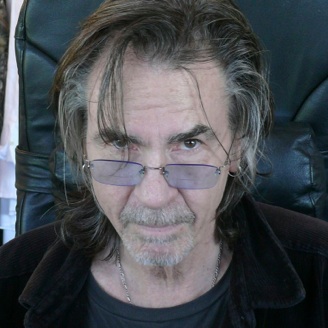
KP: Let’s touch on some of your videos, which are very impressive. One illustrates the song “Free” while others are of a more environmental nature - especially regarding the ocean. Let’s talk about that a bit.
ES: Yes, I have paid some attention to making videos of some of this music, partly because I haven't been able to take it on the road yet, and partly because I'm intrigued by the artistic options that innovative New Age music allows. The "Free" song was originally instrumental, as it is on Spirits, but after a trip to Scotland and the Scottish Highlands, I decided to write some lyrics and dedicated it to William Wallace and the other fighters for Scottish freedom in the 13th and 14th centuries. The images for the video were pictures I took on the trip.The vocal version of the song "Free" is on the
And the Earth Bleeds CD.
The environmental video, a vocal version of the title song from
And the Earth Bleeds, was made when an environmentalist/artist Kira Corser asked if she could use the song to open a conference on climate change in Sacramento, and also to use for exhibits about ocean awareness and preservation in Monterey. Of course I said yes, and the video was born. As far as why I wrote environmentally aware lyrics …well, it is an important issue. If I could do it without preaching, why not? There are plenty of songs about relationships, dancing, and beer! An updated version of that video, with additional animated footage, is being prepared for uploading later this month (January 2015), and is available at my youtube channel
here.
KP: After playing rock music for so many years, how did you gravitate over to the new age/world/celtic styles of music?
ES: In 2005, after Sonia Dada took hiatus and the writing-recording-touring cycle took a pause, I just started doing stuff I had not done before in the band or ensemble setting. In my own wee recording environment, without other musicians or singers, or even songs, I just started playing melodies and sounds with the instrument I know best, electric bass. Sometimes using effects to create a spacey environment, and then using the upper registers of the bass to play melodies and harmonies, I started to create sonic landscapes that reminded me a bit of being at the Planetarium. Then I'd bring in another instrument (sound) to flavor the landscape, and one thing led to another. I just started exploring a style of music I found a bit seductive and that others sometimes call “painterly.”
KP: I really love that your music is impossible to categorize without a whole lot of dashes or hyphens! It sounds like that’s something you do intentionally.
ES: Probably…well, yeah. I do try to create stuff that you haven't been hearing all your life. So much of the music you hear is so darn familiar, that I do try to give it a slightly different flavor, while keeping it musical, emotional and evocative. I just color with a different crayon.
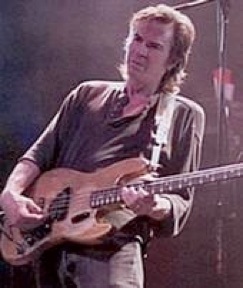
Vic Theater Chicago (photo by Michael Goldman)
KP: Bravo for that!!! Where did the nickname Eski come from? It’s catchy!
ES: Those former Turtles, Mark Volman and Howard Kaylan are largely to blame. In December 1974, Flo & Eddie and we Neo-Turtles started a tour in Denver, with the first show at the old Ebbett's Field Concert Club. We flew in the night before and were hanging in a hotel room, administering mild intoxicants and doing the first-night-on-tour-bonding-thing. On the TV in the corner was a movie Ride the Wild Surf, where college kids go to Hawaii on spring break, and the guys (Frankie Avalon, Peter Brown, etc.) try to impress the girls (Annette Funicello, etc.) by entering the Hawaiian Surf Contest. The three-time defending champion, played by Robert Mitchum's younger brother Jim, was the local Hawaiian legend Eskimo Dobbs, and it was decided by the guys that the legend of the Eskimo needed to be remembered, and carried forward, and who better for the gig than the new bass guy, the rube from Gurnee, Illinois….me. And so….Eski.
KP: Great story! I’m glad I asked! I don’t suppose you did a lot of surfing in Gurnee!
Who or what are your biggest musical influences?
ES: Everybody I ever heard or played with has influenced me, in one way or another. Either (A) "Stop me if I ever sound like that"…or (B) "Now that sounds great. What are they doing?"
KP: What inspired you to start composing your own music?
ES: The creative part of music making has always been what interests me the most. "Make your own kind of music..make your own special song."
KP: What has been your most exciting musical moment or experience so far?
ES: Besides all the great friends I've shared experiences with, there is a diverse mental scrapbook. Big shows like an Alice Cooper show on Halloween in front of 30,000 raucous rock fans in Joe Louis Arena in Detroit in 1981. More intimate shows like Flo & Eddie at the LA Troubadour on Christmas night 1974, when Keith Moon and Alice came up for the encore and we did “Wooly Bully," in addition to "Happy Together." Many moments in the recording studio, from the first excited recordings in 1972, to sessions with Sonia Dada where everything just came out great. Every time I record something new, or play live for listeners, there is excitement.
KP: Is Sonia Dada still active?
ES: Not at the moment, no. I like to use some of the guys on my solo records, and we do stay in touch with hopes of doing some work together again sometime in the future.
KP: Who are your favorite composers?
ES: There are the great classical composers of course, Beethoven, Mozart, and Tchaikovsky. The
1812 Overture by Tchaikovsky seems like it might have been one of the 'rock' pieces of its day; it even had the cannons - a long time before AC/DC. I have recently discovered a couple of Italian composers, Luigi Boccherini and Arcangelo Corelli. They composed some of the Baroque violin pieces heard in the movie
Master and Commander. As far as writers….there are so many quality written pieces. Like others I suppose, I have come to appreciate the consistent quality of writers like Bob Dylan, Paul Simon, Harry Nilsson, Don Henley, among many others, of course.
I was going to hold my powder because I worked with him for six albums, but I will say that the main writer for Sonia Dada, Dan Pritzker, is one of my favorite writers, and is for most who have really listened to his lyrics. If you listen to the first two Sonia albums, songs like “Paradise," "Oh No," "Amazing Jane," and "Screaming John" express great human sentiment about topics that aren't about the cliche staples of 'pop.' He did write the song that went #1 here in the USA and Australia, in addition to the 'deeper' songs you don't hear done well very often.
I will also say, since you brought up the topics of 'hits'…Alice could write some. “Only Women Bleed" was great, and the topical hits that are teen anthems every year, like "Eighteen" and "Schools Out"??…pretty good.
KP: Who are your favorite performers?
ES: Bold unafraid performers who give it all. It's hard to pay that kind of emotional bill every night, which is why so many of the most sincere performers burn out early.
KP: What’s up next for you?
ES: More musical adventures. Trying to keep it fresh, alive, evocative, and above all, severely listenable.
KP: Is there anything else you’d like to “talk” about?
ES: Well, let's see…politics and pizza are just too divisive, so I think I'll just wish everybody a happy and healthy 2015.
Many thanks to Erik Scott for taking the time to chat! For more information about Erik and his music, please visit
his website and/or his
Artist Page here on MainlyPiano.com.
Kathy Parsons
January 2015

